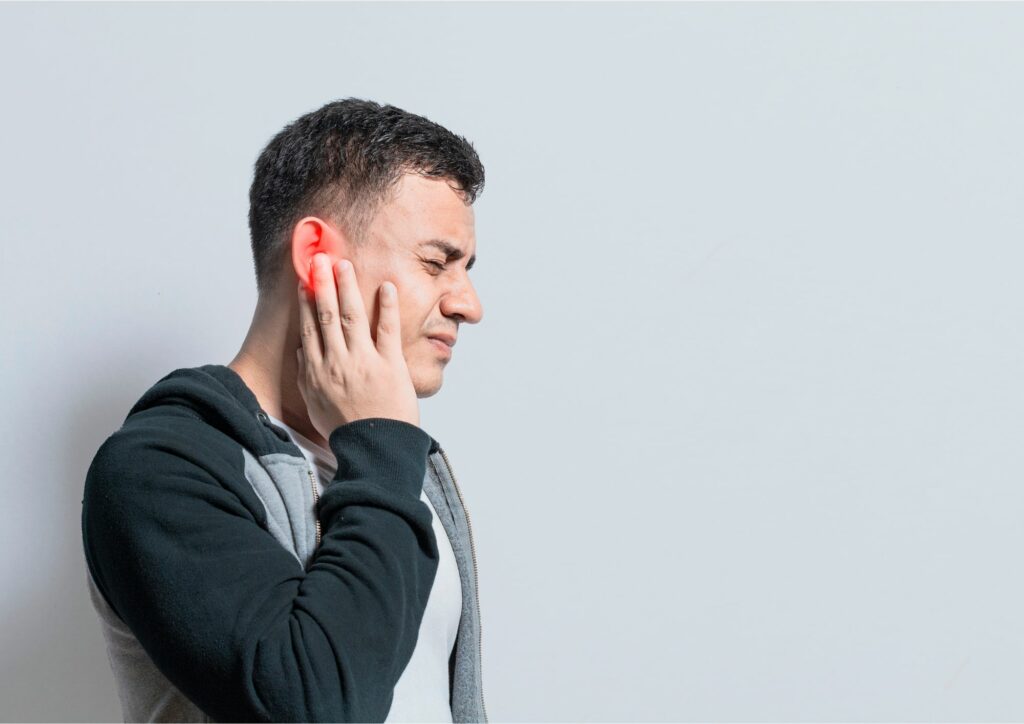TINNITUS : WHICH COMPLEMENTARY
MEDICINE TREATMENTS?

What is tinnitus?
Tinnitus are parasitic noises (buzzing, whistling …) that affect one or both ears. They are heard in the ear or in the head and are very unpleasant for the person who suffers from them. They can last a few minutes (after a concert for example) or even hours or years (we talk about chronic tinnitus). For a part of the population (in Switzerland between 10 and 18%) they are chronic and therefore have a very negative effect on the quality of life of the person or child who suffers from them.
What could be the cause?
There are two types of tinnitus:
- Subjective tinnitus – which constitutes 99% of patients who suffer from tinnitus. In this case the source is not in the ear but rather due to abnormal activity of the nerve cells in the brain. Their causes are not yet well defined but they are often correlated to a pathology (hearing impairment, auditory trauma, inner ear affections, cervical or lower jaw problems, hypertension, diabetes, hormonal disorders…). Chronic stress can also trigger tinnitus.
- Objective tinnitus – very rare – is due to a real sound source.
When to consult a doctor?
The sudden appearance of tinnitus requires an emergency consultation to identify the cause. If it is a simple earwax blockage, the problem will be easily treated. Otherwise, several therapies may be appropriate to alleviate and possibly eliminate the tinnitus. Early treatment will improve the chances of success.
Perceived noise can significantly alter the quality of life and cause nervous disorders such as stress, sleep problems…
In parallel with medical treatment, it is therefore important to work on the ability to ignore tinnitus – this will limit the impact on the mind. Sophrology can help you in this step.
Tinnitus: How can sophrology help you?
Sophrology is a marvelous tool that accompanies the tinnitus person with the help of tailor-made protocols, carefully prepared by the practitioner after the anamnesis made with the patient.
This allows you to be accompanied in the problematic that corresponds to you.
Here are some examples of how sophrology can bring a notable improvement in quality of life:
- Hyperacusis – learn how to live with surrounding sounds in a more serene way, how to manage pain with more ease, and how to regain confidence in your body’s ability to not reactivate its self-preservation reflexes.
- Meniere’s Syndrome – although the causes are still unclear, it is now well known that stress and fatigue act as triggers. In this case, as in the case of hyperacusis, you can actively participate in your recovery through sophrology. The objective of the carefully prepared protocol will be to bring you to live more serenely the crises. To do so, we will propose exercises to release your anxiety and regain confidence in your body, so that you no longer have to face the crises that will arise with negativity.
- Hearing aids – to better understand your new hearing aid and to live serenely and confidently through this transition which is sometimes perceived in a negative way.
- Apprehension about falling asleep and sleeping
- Isolation – find calm more easily and regain confidence but also hope, in order to emerge from this situation with greater serenity and self-esteem.
- Stress
More explanations/information on sophrology here.
If you have a specific question, do not hesitate to contact us using the link below:
Thanks for reading us.
Where to find us?
Rue Jean-Sénebier 20, Geneva (near Parc des Bastions).
